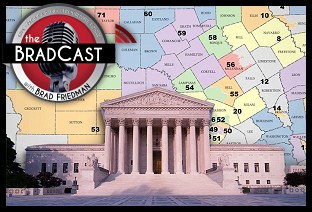READER COMMENTS ON
"EXCLUSIVE: Sequoia Voting Systems Threatens Princeton Computer Scientists with Legal Action if they Carry Out NJ Commissioned Analysis of the Company's Touch-Screen Voting Machines"
(28 Responses so far...)
COMMENT #1 [Permalink]
...
Neal
said on 3/17/2008 @ 7:31 pm PT...
The arrogance of them! By calling the Democratic party the "Democrat" party they're wearing their political bias right on their sleeve.
COMMENT #2 [Permalink]
...
Phil
said on 3/17/2008 @ 7:46 pm PT...
Gee Folks, A good old-fashioned white collar fascist mafia-style threat. The analysis of these fucked up boxes have been effectively rigged before it even starts.
How could we make it so there's nobody to sue?
Perhaps anonymous analysis of their "rigged to elect more fascists advantage system."
This whole thing stinks and just pisses me off. But you knew that already. It's so depressing that I don't even want to post a response to this. But if everyone is as depressed as I am hearing this then nobody will fucking do something about it.
Fuck Sequoia they have no fucking rights. It's OUR fucking constitution and OUR fucking vote and OUR fucking elections. Not theirs. These fucking fascists want to make CRIMINALS out of the white hat computer hackers. The only right Sequoia has is the right to have all their shit permanently de-certified and destroyed. The simple fact they put out a threat is evidence of them attempting to bias the outcome of the results before the cover even comes off the fucking box. Sequoia is a fascist company, spreading "fascist cancer" across America.
If I had the results of the test, I would drive by find an open WAP, fire up TOR and publish their shit world wide.
Really though, none of this shit matters. The bottom line is this.
No Electronic System of Tabulating votes can have public oversight because the public can not see electronic signals, parts can be specially crafted, or burn up, or be programmed to bias an outcome and this FASCIST COMPANY SEQUOIA (Along with any and all other electronic tabulation device manufactures) can not prove otherwise.
But yet they have a brick wall of lawyers.
I think it's time to become self sufficient from the US government. Stop using their money, gas and bullshit and start making your own electricity, grow your own food. We ain't gonna get no healthcare, so learn first aid.
COMMENT #3 [Permalink]
...
Phil
said on 3/17/2008 @ 7:51 pm PT...
#1, and Brad good call on the "Democrat" party. I was so pissed off I didn't even see that.
What is the party called for citizens that are anti- PNAC/AIPAC/CFR?
COMMENT #4 [Permalink]
...
David Jefferson
said on 3/17/2008 @ 9:07 pm PT...
Brad, I just want to correct one thing in the headline. The study that Felten and/or Appel are conducting is not "NJ commissioned" as you state in the headline. Yes, the NJ County Clerks voted to request an independent review, but they are not state officials. The relevant state official, who currently holds certification authority comparable to the SoS in other states, is New Jersey Attorney General Ann Milgram. She has not ordered any investigation and seems disinclined to. She is apparently satisfied with Sequoia's explanation. If BradBlog readers want to help, they could write Ms. Milgram and politely impress upon her the seriousness of the problem (almost certainly a simple bug in the Advantage firmware) and ask her to support the Princeton review or commission her own independent technical review.
I might add that the Princeton scientists do not have access to the source code for the Advantage (as far as I know). They really should have that in order to do a quicker and more thorough review. Since Sequoia is obviously not cooperating, it will require the AG's leverage to get that.
One further complication: It is my understanding that the powers of the Attorney General of NJ over voting systems will be transferred to the Secretary of State of NJ in April, so it is quite possible that AG Milgram will do nothing, and leave the problem to SoS Nina Mitchell Wells next month.
{Ed Note: Thanks for the details, David. I've added an update to point to your comment at the end of the original article above. Milgram can be contacted here for those inclined to do so. As to whether or not the study in question is "NJ commissioned", I tried to be careful about my wording of that in the headline, since my understanding was that we were waiting on state officials to decide *if* they were going to commission such a study. Even though Sequoia has gone on the offensive to let them know in advance that they will take action if that were to happen. If, on the other hand, a study is commencing by Felten and/or Appel anyway, as commissioned by someone else, please let me know if you could. My understanding is that question is still up for grabs, as you seemed to note in your comment above, and thus I *tried* to be careful with the headline to that effect. If I need to clarify it, of course, I'll be happy to. --- Brad}
COMMENT #5 [Permalink]
...
Marybeth Kuznik
said on 3/17/2008 @ 9:30 pm PT...
I was there in 2006n when Shamos "accidentally" hacked a Sequoia Advantage and make about 5 votes for a test candidate jump to over 8000. It was BAD.
I was there this past January when Northampton County PA held a Voting System Fair that led to their spending several million of our PA tax dollars to purchase of 300 used (yes, USED!) Sequoia Advantage machines to replace the decertified and now orphaned WINvote DREs. This is WORSE than bad; this is plain foolish.
We now have 737,043 registered Pennsylvania voters (using 11/07 registration figures, given the increased registrations for the Primary here this number is probably a lot higher) in two of our largest counties that will have to trust their votes next month to these junkpiles.
And in the event of trouble while voting, I guess these poor voters are not even allowed to discuss anything the machines do wrong. Because according to Smith no one is allowed to "publish" anything about the "behavior" of Sequoia's software as that would infringe on Sequoia's intellectual property rights???
Say WHAT???
COMMENT #6 [Permalink]
...
justadood
said on 3/17/2008 @ 9:31 pm PT...
a 4-word response is all that Sequoia need be given for their bullshit threat--- "See you in Court"
--I doubt any judge, lib or con, would want to touch this, especially once the scientists show the machines failing under even rudimentary testing...much less what the boxes do once you stray into NDA-land
COMMENT #7 [Permalink]
...
David Jefferson
said on 3/17/2008 @ 9:51 pm PT...
Justadood--
With all due respect, the courts have a poor record in ruling on lawsuits regarding voting system failures, generally siding with election officials. And besides, the courts are very slow. We have only a matter of weeks before the Pennsylvania primary in which the same machines will be used in Philadelphia, and only a few months more until the general election. This bug (and any others discovered) must be fixed. It is a much more direct and expeditious strategy to educate the relevant public officials and incentivise them to do the right thing--call for an independent technical review, and base subsequent corrective action on the results of that review. That has worked much more consistently.
COMMENT #8 [Permalink]
...
Phil
said on 3/17/2008 @ 10:22 pm PT...
And David Jefferson #7 hits the nail on the head for a home run!
This is how we are being manipulated. This is what must be stopped if we want to have a constitutional republic again.
Cause right now it's a dictatorship.
And I am tired of it.
Tired of writing about it.
Tired of talking about it.
COMMENT #9 [Permalink]
...
csbrudy
said on 3/17/2008 @ 11:29 pm PT...
Let Sequoia sue. Felton and Appel should perform their tests as soon as as possible. Any lawsuit by Sequoia would just bring more public attention to how wretchedly inadequate and dangerous the machines actually are. Any jury would throw the suit out, and if we were lucky, the public would scream for indictments. That is, if there were any press at all.
COMMENT #10 [Permalink]
...
youngharry
said on 3/17/2008 @ 11:50 pm PT...
Yes, let them sue.
Let the Professors begin immediately. THE LINE HAS BEEN DRAWN AND THAT IS A GOOD THING!!
Millions of Americans will stand behind the Professors along with the ACLU and many other Organizations.
START THE ANALYSIS NOW!!!
LET'S HAVE IT OUT ONCE AND FOR ALL!!!
COMMENT #11 [Permalink]
...
MeatWadGetsIt
said on 3/18/2008 @ 5:00 am PT...
There is a quick fix, paper ballots with an open hand count of those ballots, with as many witnesses to that hand count as want to witness it.
The lawsuits, let them begin, as someone stated, the line has been drawn,and it is time we step over that bluff.
COMMENT #12 [Permalink]
...
TLV
said on 3/18/2008 @ 5:20 am PT...
Does PA have early voting? If so, I recommend all voters go to the election headquarters and cast an ABSENTEE ballot. Do NOT use the machines!
COMMENT #13 [Permalink]
...
UMustBKiDNG
said on 3/18/2008 @ 6:22 am PT...
Intellectual Property?
This is the thing I don't get about ALL the rigged electronic voting machine stories. They always claim the need to protect their software, IP rights, .... Seriously, these are VOTING machines, literally counting one plus one. There is nothing at all complicated about it. The software used to run this blog is much more sophisticated. This doesn't seem like a strong legal objection to me.
COMMENT #14 [Permalink]
...
molly
said on 3/18/2008 @ 6:50 am PT...
Democracy Now had the writer from the Times Magazine on not long ago. He said,"No scientist has proven these voting machines hackable." I was surprised Amy Goodman didn't correct him. Please send this post to her. She has as many viewers as Meet the Press. They are tied as #1 news programs.
COMMENT #15 [Permalink]
...
Michael Dean
said on 3/18/2008 @ 6:52 am PT...
The software most likely to steal elections is the BALLOT DEFINITION SOFTWARE loaded on optical ballot scanner and DRE touch-screen voting machines in county elections offices across the U.S. just before the machines are sealed with security tape and transported to election polling locations.
Ballot definition software is constructed for each election and defines the ballot positions for each candidate and proposition for each voting precinct. Miami-Dade County in Florida, for example, has 750 voting precincts and usually requires several dozen unique ballot definitions for federal general elections.
Ballot definition software creates the ballot image that people see on the screens of every brand of touch-screen voting machine. DRE touch-screen and optical ballot scan machines use ballot image coordinates, also coded in the software, to determine how finger touches on the touch-screen or marks on the paper ballot are mapped to candidate positions on the ballot. The software tabulates finger touches and marks on paper ballots as candidate votes and then stores those tabulated vote counts in the machine’s “virtual ballot box” data memory card. Ballot definition software finally tallies final election results when the polls close on election day.
All DRE touch-screen and optical ballot scanner manufacturers and vendors hold that all software, including the ballot definition software, is proprietary and confidential (secret) and may not viewed by county election officers, election judges, candidates running for office or citizen election observers. Moreover, Judges have accepted this proprietary and confidential argument. Presiding Florida Circuit Court Judge William L. Gary denied plaintiff Christine Jennings’ motion to allow review of the source code for the DRE touch-screen machines used in the contested 2006 U.S. House race between Democrat Christine Jennings and Republican Vern Buchanan for Florida's 13th district.
Nearly every state still has within its election code a provision that allows public observers the right to inspect physical ballot box containers to make sure they are empty and to inspect paper ballots to make sure they are accurate and complete before the polls open on Election Day. (Example: New Hampshire Election Code Section 658:36 Inspection of Ballot Box – At the opening of the polls, the ballot box shall be publicly opened and shown to be empty; and the election officers shall ascertain that fact by a personal examination of the box. eff. July 1, 1979) Nearly every state also still has within its election code a provision that allows public observers to watch election clerks open physical ballot box containers and count the paper ballots at the end of the Election Day.
Ballot and ballot box inspection laws are on the books of every state because of the numerous historical accounts that partisans are known to have stuffed ballot boxes in a wide variety of ways.
Activist Judicial rulings that ballot definition software is proprietary and confidential to machine vendors creates new law that runs contrary to laws already on the books of nearly every state. Election law that affirm it is not only the right, but also the duty of election judges and clerks and election observers in every voting precinct to inspect paper ballots and each ballot box container to certify ballots are accurate and ballot boxes are empty!
In the November 2006 election there were 1,142 counties using DRE voting machines and 1,752 counties using optical scanners. This tabulates to 2,894 counties and 161,111 voting precincts that depend on ballot definition software written in weeks and days just before the election last November. That adds up to a lot programmers writing a lot of "last minute" ballot definition software that election officials never visually audited or comprehensively tested in the 2006 mid-term general election.
For the 2008 primary and general election season, the use of DRE touch-screen voting machines has decreased slightly while the use of optical scanners has increased over the U.S. While the numbers have shifted slightly over the past two years, the total number election jurisdictions using some type of electronic machine running ballot definition software at polling places or the central elections office for ballot tabulation continues to increase.
The task of creating ballot definition and tallying software is so large and complex that many counties contract the work to voting machine vendors or consulting/programming companies. Most vendor and consulting companies themselves do not maintain a staff of programmers large enough to write all the ballot definition software for all the voting precincts of all their county elections officer customers across the U.S. Therefore, the work is often subcontracted to yet another layer of contract programmers. These subcontractors may or may not be U.S. citizens.
Current law even allows large off-shore software consulting companies now operating in India, Israel, Saudi Arabia, China, or Russia to write ballot definition software.
Who checks the credentials of all these contract programmers writing "last minute" ballot software? Who asks if contract programmers work for a foreign government, other foreign interest, political party or candidate up for election or if they have criminal records? Who checks to make sure they do not have connections to a Carl Rove type political operative. Who performs detailed audits or certification testing of the software they write? The frightening answer to all questions is - no one!
Local election officials are not computer scientists nor do they even understand how vulnerable any software, particularly ballot definition software, is to inadvertent bug malfunction or malicious perversion.
The frightening truth is, local election officials often make no effort verify that ballot definition software is bug free or that someone in the software chain of custody did not nefariously insert a few extra lines of software code that activates only on election day to flip votes or rig vote totals on a central tabulator and then self delete at the end of the election day.
The more that unchecked and untested software is used in the administration of elections, the more election officials hand control of elections over to unchecked and unseen computer programmers.
It is so easy for a political partisan or foreign government to entice or direct contract programmers writing or handling ballot definition software to stuff the software ballot box as they perform their legitimate duties. Even just a few motivated partisan programmers each working independently could easily throw an election!!
COMMENT #16 [Permalink]
...
skeptic94514
said on 3/18/2008 @ 8:15 am PT...
Another act of the facist, neo con estabilshment. They continue to their weight around and try to stop the US return to democracy.
Its time to start the testing and estabilish a legal defense fund. Also, a countersuite against Sequoia and their executives should be started, immediately.
COMMENT #17 [Permalink]
...
JEANNIE DEAN in FL-13
said on 3/18/2008 @ 8:21 am PT...
Wow, Michael Dean!! I could KISS you! GREAT post/ (great last name, too~!) Thank you so much...we always SUSPECTED BALLOT DEFINITION PROGRAMMING as a possible source of the bug in the CD-13 election (and others); your above observations hit me in the gut like a sad truth often does.
I was AT the TALLAHASSEE hearing, and was so devastated by Judge Gary's derisive ruling I went to a mountain-top and drank brandy for two weeks and stared at some goats. The goats didn't care, and I began to think, "maybe they've got a point..."
Michael, not sure if you've already seen the following video (cobbled and spliced, as we were not allowed to video tape the proceedings even though we filled out all the appropriate paperwork. We DID manage to get some video/ stills when the AP photographer--I kid you not--left because he was bored):
FL-13 HEARINGS: Evidence/ "Who Had Warehouse Access?"
http://www.youtube.com/watch?v=4acC583ZfWc
(...M.I.T. Prof. Charles Stewart presents UNHEARD TESTIMONY in the CD-13 Jennings case re: Sarasota's undervote rate on ES&S's iVotronic machines.)
Prof. Stewarts' Bubble Chart, presented as evidence to the honorable(?) William L. "Google Me, I dare ya" Gary, shows that the more machines prepared leading up to election day, the higher the undervote rate.
Also see:
http://www.youtube.com/watch?v=bXcyzVtMGD4
"FL-13 CATCH 22: ES&S's Opening Misstatements"
(...and you thought the VENDORS were warped. Get a load of their LAWYERS.)
COMMENT #18 [Permalink]
...
Bill
said on 3/18/2008 @ 8:30 am PT...
Acts of the neo cons, facsists trying to stop a return to democracy? What utter nonsense! The US is a constitutional republic, not a democracy. At least it is supposed to be a constitutional republic. Do you really think there is a dime's worth of differnece between the repugs and the demons? They are two sides of the same coin, manipulating you to think you have a choice. Wake up, smell the tuna fish, throw off your public school education and educate yourself. Comments like Skeptic94514's prove that the brainwashing is working.
TEST THE SOFTWARE AND TO HELL WITH THOSE EMPTY THREATS!
COMMENT #19 [Permalink]
...
naschkatze
said on 3/18/2008 @ 9:08 am PT...
A little off topic but not too much since this is the blog to go to for election faults. What ever happened in NY with the 80 or so precincts which showed Obama getting 0 but then on recount showed him getting substantial amounts, in one egregious case going from 0 to 116? Were those tallies officially approved in their original count or as corrected?
COMMENT #20 [Permalink]
...
Maximillian
said on 3/18/2008 @ 9:50 am PT...
Its not who votes but who counts the votes.
COMMENT #21 [Permalink]
...
brantl
said on 3/18/2008 @ 10:07 am PT...
Is this lady a Republican?
COMMENT #22 [Permalink]
...
Dredd
said on 3/18/2008 @ 11:04 am PT...
So they want to make headlines:
Electronic Voting Machine Company Sues Scientists To Stop Further Testing of Electronic Voting Machines After It Has Been Proven That Such Machines Lack Security
That seems to indicate that Smith has an insecurity complex to go along with his superiority complex. Now that will f**k a person up really bad!
COMMENT #23 [Permalink]
...
Michael Dean
said on 3/18/2008 @ 11:14 am PT...
JEANNIE DEAN post #17... Thanks for your comment... I tend more toward Tennessee Whiskey, but I'm with you on that mountain-top... BTW, love the material in your act....
COMMENT #24 [Permalink]
...
Gregory Miller
said on 3/18/2008 @ 12:35 pm PT...
First, thanks to Brad for staying on top of these issues. And second, my compliments to Michael Dean on a cogent comment with regard to ballot design and the issue of conflict of laws (e.g., intellectual property rights vs. election process supervision and inspection rights). Nicely done. Would love to connect with you, Michael, off line from here. You can find me at the OSDV Foundation.
My comment is simply that this is yet another example of how we must shift from "black box voting" to "glass box voting." It is the only way we can restore trust in the vote in an increasingly digital democracy.
To do so requires complete transparency in design, development, and production of the machinery that serves as a cornerstone of our democracy. A mandate of open source methods in both hardware and software is an imperative start. Such work must become a digital public works, and the results held in the public trust.
COMMENT #25 [Permalink]
...
Gregory Miller
said on 3/18/2008 @ 1:15 pm PT...
I also wanted to compliment David Jefferson's comments here. They are spot-on as I mentioned in my post on Brad's reporting.
COMMENT #26 [Permalink]
...
Michael Dean
said on 3/18/2008 @ 1:24 pm PT...
Gregory Miller comment #24... Greg, I sent my contact info via your OSDV Foundation "Contact Us" msg form. Michael
COMMENT #27 [Permalink]
...
Brad Friedman
said on 3/18/2008 @ 3:48 pm PT...
Wish to share in the kudos for Michael Dean's original note above which, frankly, deserves to be it's own BRAD BLOG Guest Blog.
Will touch base w/ you in that regard, Michael.
COMMENT #28 [Permalink]
...
slsatchel
said on 3/25/2008 @ 2:56 am PT...
While the numbers have shifted slightly over the past two years, the total number election jurisdictions using some type of electronic machine running ballot definition software at polling places or the central elections office for ballot tabulation continues to increase.
 -- Brad Friedman
-- Brad Friedman The call by state election officials for the independent study of Sequoia's AVC Advantage touch-screen machines comes in the wake of a recent finding that the systems mistallied voter turnout totals across at least six different counties in New Jersey's February 5th Presidential Primary Election. During a post-election canvass, it was found that the number of voters for each party, as reported by the internal printouts on the electronic voting machines, failed to match totals on the internal memory cards inside the same systems in a number of instances across the state.
The call by state election officials for the independent study of Sequoia's AVC Advantage touch-screen machines comes in the wake of a recent finding that the systems mistallied voter turnout totals across at least six different counties in New Jersey's February 5th Presidential Primary Election. During a post-election canvass, it was found that the number of voters for each party, as reported by the internal printouts on the electronic voting machines, failed to match totals on the internal memory cards inside the same systems in a number of instances across the state. Appel's findings followed a similar, perhaps even more embarrassing situation in Pennsylvania just prior to the 2006 Election when longtime e-voting supporter Dr. Michael Shamos, a Carnegie Mellon University professor, accidentally hacked a Sequoia voting system while in the process of demonstrating to onlookers how the systems couldn't be hacked. Shamos was able to instantly "transform a handful of votes into thousands," as it was reported at the time. The vulnerability inadvertently discovered by Shamos derailed Pennsylvania's plan to quick certify the systems for use in the state's Primaries that year.
Appel's findings followed a similar, perhaps even more embarrassing situation in Pennsylvania just prior to the 2006 Election when longtime e-voting supporter Dr. Michael Shamos, a Carnegie Mellon University professor, accidentally hacked a Sequoia voting system while in the process of demonstrating to onlookers how the systems couldn't be hacked. Shamos was able to instantly "transform a handful of votes into thousands," as it was reported at the time. The vulnerability inadvertently discovered by Shamos derailed Pennsylvania's plan to quick certify the systems for use in the state's Primaries that year.

 SCOTUS Ruling a How-To for Unlawful Gerrymandering on 'Eve' of Critical Election Year: BradCast' 12/17/25
SCOTUS Ruling a How-To for Unlawful Gerrymandering on 'Eve' of Critical Election Year: BradCast' 12/17/25 Bricks in the Wall:
Bricks in the Wall: 'Green News Report' 12/16/25
'Green News Report' 12/16/25
 'This One Goes to 11': Weekend of Violence, Tragic Murder of Rob Reiner: 'BradCast' 12/15
'This One Goes to 11': Weekend of Violence, Tragic Murder of Rob Reiner: 'BradCast' 12/15 Sunday 'WTF?' Toons
Sunday 'WTF?' Toons Trump Now Losing One
Trump Now Losing One 'Green News Report' 12/11/25
'Green News Report' 12/11/25 Dems Continue Stunning 2025 Election Streak: 'BradCast' 12/10/25
Dems Continue Stunning 2025 Election Streak: 'BradCast' 12/10/25 Petrostates and Propagandists Undermining Climate Science: 'BradCast' 12/9/25
Petrostates and Propagandists Undermining Climate Science: 'BradCast' 12/9/25 'Green News Report' 12/9/25
'Green News Report' 12/9/25 The High Cost of Trump's Terrible Policy Making: 'BradCast' 12/8/25
The High Cost of Trump's Terrible Policy Making: 'BradCast' 12/8/25 Sunday 'All in a Day's Work' Toons
Sunday 'All in a Day's Work' Toons Dems Fight to Avoid the GOP's Massive, Year-End Health Care Cliff: 'BradCast' 12/4/25
Dems Fight to Avoid the GOP's Massive, Year-End Health Care Cliff: 'BradCast' 12/4/25 'Green News Report' 12/4/25
'Green News Report' 12/4/25 A 'Flashing Red Warning Sign' for GOP: 'BradCast' 12/3/25
A 'Flashing Red Warning Sign' for GOP: 'BradCast' 12/3/25 Hegseth, War Crimes and DoD's 'Politicization Death Spiral': 'BradCast' 12/2/25
Hegseth, War Crimes and DoD's 'Politicization Death Spiral': 'BradCast' 12/2/25 Follow the
Follow the  With Thanks, No Kings and Good Cheer
With Thanks, No Kings and Good Cheer Presidential Illegality and Duty to Disobey
Presidential Illegality and Duty to Disobey President of United States Calls for Killing Democratic Officials: 'BradCast' 11/20/25
President of United States Calls for Killing Democratic Officials: 'BradCast' 11/20/25 Is MAGA Finally Beginning to Fall Apart?: 'BradCast' 11/19/25
Is MAGA Finally Beginning to Fall Apart?: 'BradCast' 11/19/25 Trump's Terrible, Horrible, No Good, Very Bad Week: 'BradCast' 11/18/25
Trump's Terrible, Horrible, No Good, Very Bad Week: 'BradCast' 11/18/25
 VA GOP VOTER REG FRAUDSTER OFF HOOK
VA GOP VOTER REG FRAUDSTER OFF HOOK Criminal GOP Voter Registration Fraud Probe Expanding in VA
Criminal GOP Voter Registration Fraud Probe Expanding in VA DOJ PROBE SOUGHT AFTER VA ARREST
DOJ PROBE SOUGHT AFTER VA ARREST Arrest in VA: GOP Voter Reg Scandal Widens
Arrest in VA: GOP Voter Reg Scandal Widens ALL TOGETHER: ROVE, SPROUL, KOCHS, RNC
ALL TOGETHER: ROVE, SPROUL, KOCHS, RNC LATimes: RNC's 'Fired' Sproul Working for Repubs in 'as Many as 30 States'
LATimes: RNC's 'Fired' Sproul Working for Repubs in 'as Many as 30 States' 'Fired' Sproul Group 'Cloned', Still Working for Republicans in At Least 10 States
'Fired' Sproul Group 'Cloned', Still Working for Republicans in At Least 10 States FINALLY: FOX ON GOP REG FRAUD SCANDAL
FINALLY: FOX ON GOP REG FRAUD SCANDAL COLORADO FOLLOWS FLORIDA WITH GOP CRIMINAL INVESTIGATION
COLORADO FOLLOWS FLORIDA WITH GOP CRIMINAL INVESTIGATION CRIMINAL PROBE LAUNCHED INTO GOP VOTER REGISTRATION FRAUD SCANDAL IN FL
CRIMINAL PROBE LAUNCHED INTO GOP VOTER REGISTRATION FRAUD SCANDAL IN FL Brad Breaks PA Photo ID & GOP Registration Fraud Scandal News on Hartmann TV
Brad Breaks PA Photo ID & GOP Registration Fraud Scandal News on Hartmann TV  CAUGHT ON TAPE: COORDINATED NATIONWIDE GOP VOTER REG SCAM
CAUGHT ON TAPE: COORDINATED NATIONWIDE GOP VOTER REG SCAM CRIMINAL ELECTION FRAUD COMPLAINT FILED AGAINST GOP 'FRAUD' FIRM
CRIMINAL ELECTION FRAUD COMPLAINT FILED AGAINST GOP 'FRAUD' FIRM RICK SCOTT GETS ROLLED IN GOP REGISTRATION FRAUD SCANDAL
RICK SCOTT GETS ROLLED IN GOP REGISTRATION FRAUD SCANDAL VIDEO: Brad Breaks GOP Reg Fraud Scandal on Hartmann TV
VIDEO: Brad Breaks GOP Reg Fraud Scandal on Hartmann TV RNC FIRES NATIONAL VOTER REGISTRATION FIRM FOR FRAUD
RNC FIRES NATIONAL VOTER REGISTRATION FIRM FOR FRAUD EXCLUSIVE: Intvw w/ FL Official Who First Discovered GOP Reg Fraud
EXCLUSIVE: Intvw w/ FL Official Who First Discovered GOP Reg Fraud GOP REGISTRATION FRAUD FOUND IN FL
GOP REGISTRATION FRAUD FOUND IN FL

































